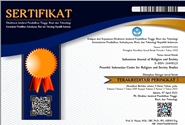Meutaloe Wareeh Agricultural Empowerment Model in Organic Rice Farming Groups in North Aceh
Abstract
This study aims to develop and analyze the effectiveness of the Meutaloe Wareeh agricultural empowerment model in organic rice farmer groups in North Aceh. Meutaloe Wareeh is a local wisdom approach rooted in the values of cooperation and togetherness in Acehnese society, which is applied in sustainable agricultural land management. This model integrates organic farming practices with the principles of active farmer participation, environmentally friendly natural resource management, and capacity building through training and mentoring. The results of the study indicate that the implementation of the Meutaloe Wareeh model significantly increased organic rice productivity and farmer welfare in North Aceh. In addition, this model has succeeded in reducing farmer dependence on chemical agricultural inputs and increasing local food security. Factors such as community commitment, government support, and access to organic markets have also played a role in the success of this model. However, challenges related to technology adaptation and climate change are still major concerns. Overall, the Meutaloe Wareeh model has proven great potential as a holistic and sustainable agricultural empowerment strategy, which can be replicated in other areas with adjustments to the local context.
Keywords
Full Text:
PDFReferences
Alfiady, T., Yunanda, R., & ND, M. A. (2022). Community Empowerment in Alleviating Poverty During the Covid 19 Pandemic in Bener Meriah Regency. 2nd International Conference on Social Science, Political Science, and Humanities (ICoSPOLHUM 2021), 39–43. Atlantis Press.
Arnstein, S. R. (1969). A ladder of citizen participation. Journal of the American Institute of Planners, 35(4), 216–224.
Bahua, M. I., Arsyad, M., & Jamil, M. H. (2016). Farmers community empowerment through institutional strengthening of rural food barn. International Journal of Agriculture System, 4(2), 161–167.
Bourdieu, P. (2018). The forms of capital. In The Sociology of Economic Life, Third Edition. https://doi.org/10.4324/9780429494338
Cassani, J. M., dos Santos, W., Carneiro, F. F. B., de Carvalho, L. O. R., & Neto, A. F. (2020). Práticas Científicas em Circulação no GTT Memórias da Educação Física e Esporte do Colégio Brasileiro de Ciências do Esporte (2005-2017). Retos, 83.
Coleman, J. (1999). Coleman, J. S. (1988). Social Capital in the Creation of Human Capital. The American Journal of Sociology, 94(1988).
Colemen, P. (2012). The Missing Piece in Sustainable Peace. Diakses 27 Mei 2022. Retrieved from http://www.huffingtonpost.com/peter-t-coleman-phd/the-missingpiece-in-sust_b_2084195.html
Creswell, J. W. (2015). Penelitian Kualitatif & Desain Riset. Mycological Research.
Dianteill, E. (2003). Pierre Bourdieu and the sociology of religion: A central and peripheral concern. Theory and Society. https://doi.org/10.1023/b:ryso.0000004968.91465.99
Efrina, L. (2022). Efforts to improve community welfare through farming group empowerment from an islamic economic perspective. Indonesian Journal of Islamic Economics and Finance, 2(2), 95–109.
Fafchamps, M. (2013). Development and social capital. In Understanding Poverty and Well-Being (pp. 96–114). Routledge.
Häuberer, J. (2011). The Network Approach to Social Capital – The Concept of Ronald S. Burt. In Social Capital Theory. https://doi.org/10.1007/978-3-531-92646-9_4
Holikman, E. A., & Susilawati, W. (2020). Peranan Gabungan Kelompok Tani (Gapoktan) Dalam Pemberdayaan Petani Padi Sawah Di Desa Tuo Sumay Kecamatan Sumay Kabupaten Tebo. AGRITURE (Journal Agribusiness Future), 2(1), 45–60.
Huberman, A., & Miles, M. (2002). The Qualitative Researcher’s Companion (1st ed.). California: SAGE Publications, Inc. https://doi.org/10.4135/9781412986274
Irfany, M. I., Purwawangsa, H., Slamet, A. S., Prawiro, B. P., & Haq, D. A. (2024). Sustainable Rural Business Ecosystem of Pineapple Commodity in Peatland and Mangrove Ecosystem with One Village One CEO (OVOC) Program. IOP Conference Series: Earth and Environmental Science, 1359(1), 12049. IOP Publishing.
Latifah, N., Fauzi, F., Zainal, S., & Kasim, F. M. (2022). Strategi Jaringan Sosial Nelayan Keramba Jaring Apung Dalam Membantu Perekonomian Keluarga (Studi Di Desa Teluk One-One, Kecamatan Lut Tawar, Kabupaten Aceh Tengah, Takengon). Jurnal Sosiologi Dialektika Sosial, 8(1), 65–73.
Madonna, M., Sumardjo, S., Amanah, S., & Anwas, E. O. M. (2022). Mobilization of Cyber Extension Participants to Build Household Food Security. Jurnal Penelitian Pendidikan IPA, 8(SpecialIssue), 67–75.
Maulida, D., Kesha, C. N., & Safrida, S. (2024). Partisipasi Masyarakat Dalam Mewujudkan Community Based Tourism Sebagai Upaya Pengembangan Wisata Di Kabupaten Aceh Barat. Jurnal Ilmu Sosial Dan Ilmu Politik Malikussaleh (JSPM), 5(2), 110–125.
Mihaylov, N., & Perkins, D. D. (2014). Community place attachment and its role in social capital development. Place Attachment: Advances in Theory, Methods and Applications, 61.
Moento, P. A., Kusumah, R., Betaubun, A., & Oja, H. (2020). Penguatan kelompok usaha tani berbasiskan pemberdayaan masyarakat petani padi. Societas, 9(1).
Nababan, F. E., & Regina, D. (2021). The challenges of integrated farming system development towards sustainable agriculture in Indonesia. E3S Web of Conferences, 306, 5015. EDP Sciences.
Ningrum, M. S., Karwati, L., & Novitasari, N. (2022). Pemberdayaan Masyarakat Melalui Kelompok Tani Dalam Meningkatkan Pendapatan Petani Padi (Studi Pada Kelompok Mekar Tani Di Kelurahan Babakan Kalangsari Kecamatan Cipedes Kota Tasikmalaya). Learning Community: Jurnal Pendidikan Luar Sekolah, 6(1), 9–16.
Nirzalin, N., Nazarudin, M., Hartami, P., Fakhrurrazi, F., Al-Usrah, C. R., & Zainal, S. (2023). Pemberdayaan Ekonomi Pemuda Pengangguran Musiman Melalui Usaha Ternak Bebek Serati Di Kota Lhokseumawe, Aceh. Jurnal Solusi Masyarakat (JSM), 1(1), 64–75.
Ovitasari, M. (2022). Regulatory and Policy Responses toward SDGs in Achieving Sustainable Agriculture Productivity in Indonesia. IOP Conference Series: Earth and Environmental Science, 985(1), 12027. IOP Publishing.
Steinkuehler, C. A., & Williams, D. (2006). Where everybody knows your (screen) name: Online games as “third places.” Journal of Computer-Mediated Communication, 11(4). https://doi.org/10.1111/j.1083-6101.2006.00300.x
Tanjung, D., Kriswantriyono, A., Purnamadewi, Y. L., Suhardjito, D., & Wulandari, Y. P. (2024). The roles of innovations for village development in rural-urban linkages in West Java Province. IOP Conference Series: Earth and Environmental Science, 1359(1), 12056. IOP Publishing.
Tzanakis, M. (2013). Social capital in Bourdieu’s, Coleman’s and Putnam’s theory: empirical evidence and emergent measurement issues. Educate, 13(2).
Wojahn, R. M., Ramos, S. P., & De Carvalho, L. C. (2018). Proposta de modelo para avaliação da satisfação com a qualidade do ensino. Revista Gestão Universitária Na América Latina - GUAL. https://doi.org/10.5007/1983-4535.2018v11n1p1
Yunus, S., Zainal, S., & Jalil, F. (2017). Commodity and Institution Integration; A Model of Rural Economic Empowerment. Sodality Jurnal Sosiologi Pedesaan (Terakreditasi), 5(3), 201–209.
Zimmerman, B. J. (2000). Self-efficacy: An essential motive to learn. Contemporary Educational Psychology, 25(1), 82–91.
DOI: https://doi.org/10.36256/ijrs.v7i1.457
Refbacks
- There are currently no refbacks.
Copyright (c) 2025 Indonesian Journal of Religion and Society

This work is licensed under a Creative Commons Attribution-NonCommercial 4.0 International License.
Indonesian Journal of Religion and Society (IJRS) Is Indexed By:

Indonesian Journal of Religion and Society (IJRS) is distribute under Creative Commons Attribution-NonCommercial 4.0 International License.













